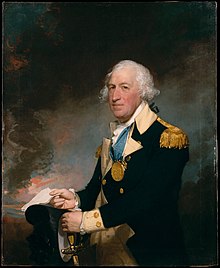
Back هوراشيو غيتس Arabic Гарацыа Гейтс Byelorussian Horatio Gates Catalan Horatio Gates Danish Horatio Gates German Horatio Gates Esperanto Horatio Gates Spanish هوراتیو گیتس Persian Horatio Gates Finnish Horatio Gates French
Horatio Gates | |
|---|---|
 | |
| Born | July 26, 1727 Maldon, Essex, Great Britain |
| Died | April 10, 1806 (aged 78) New York City, U.S. |
| Buried | |
| Allegiance | |
| Service | |
| Years of service | 1745–1769 1775–1783 |
| Rank | Major (Great Britain) Major general (United States) |
| Commands | Continental Army
|
| Battles / wars | |
| Signature | |
Horatio Lloyd Gates (July 26, 1727 – April 10, 1806) was a British-born American army officer who served as a general in the Continental Army during the early years of the Revolutionary War. He took credit for the American victory in the Battles of Saratoga (1777) – a matter of contemporary and historical controversy – and was blamed for the defeat at the Battle of Camden in 1780. Gates has been described as "one of the Revolution's most controversial military figures" because of his role in the Conway Cabal, which attempted to discredit and replace General George Washington; the battle at Saratoga; and his actions during and after his defeat at Camden.[1][2]
Born in the town of Maldon in Essex, Gates served in the British Army during the War of the Austrian Succession and the French and Indian War. Frustrated by his inability to advance in the army, Gates sold his commission and established a small plantation in Virginia. On Washington's recommendation, the Continental Congress made Gates the Adjutant General of the Continental Army in 1775. He was assigned command of Fort Ticonderoga in 1776 and command of the Northern Department in 1777. Shortly after Gates took charge of the Northern Department, the Continental Army defeated the British at the crucial Battles of Saratoga. After the battles, some members of Congress considered replacing Washington with Gates, but Washington ultimately retained his position as commander-in-chief of the Continental Army.
Gates took command of the Southern Department in 1780, but was removed from command later that year after the disastrous Battle of Camden. Gates's military reputation was destroyed by the battle and he did not hold another command for the remainder of the war. Gates retired to his Virginia estate after the war, but eventually decided to free his slaves and move to New York. He was elected to a single term in the New York State Legislature and died in 1806.
- ^ Billias, p. 80
- ^ Tuchman, Barbara W. The First Salute: A View of the American Revolution. New York: Ballantine Books, 1988. p.192